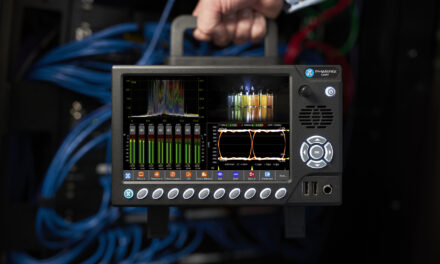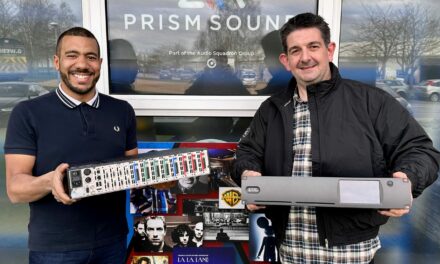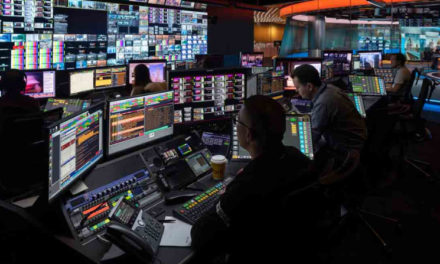ALAMEDA, USA – February 14, 2024 – In the realm of reality television production, the perception that success hinges solely on assembling strangers in various settings and arming them with microphones and cameras is a common misconception. Renowned audio engineer and intercom system designer Glenn Gaines, owner of G2 Sound, challenges this notion as he highlights the pivotal role played by Clear-Com®‘s state-of-the-art intercom system in the production of the immensely popular “Love Is Blind“, whose newest season comes out this Valentine’s Day. With Clear-Com’s intercom system at the heart of communication, Love Is Blind exemplifies the industry’s commitment to pushing boundaries and maintaining the highest standards in television production.
Gaines, an industry veteran with a track record dating back to the 1990s on shows such as “The Biggest Loser” and “RuPaul’s Drag Race,” underscores the intricacies of reality TV, emphasising that Love Is Blind surpasses the demands of most productions in the genre. Clear-Com’s intercom system, designed and provided by G2 Sound, stands out as a crucial component in ensuring seamless communication in the face of the show’s unique challenges.
As Gaines explains, reality TV, particularly in complex environments with dynamic contestant interactions, requires a level of technical sophistication that sets it apart from scripted shows. “The amount of expertise it takes to set these shows up certainly keeps us involved,” says Gaines. Contrary to the perception that reality TV compromises technical standards, he contends that it often surpasses scripted counterparts in terms of the challenges posed to production teams.
Love Is Blind, created by Chris Coelen and produced by Kinetic Content, is a social experiment where single men and women hope to find love and get engaged before meeting in person. At first blush, falling in love, let alone proposing, with those limitations sounds crazy. That said, perhaps it shouldn’t. After all, transparent, ongoing, and seamless communication is arguably far more crucial to a lasting relationship than the first, heady moments of attraction. Season One of the show – released in 2020, became Netflix’s number-one trending program, and since then, the show has spent more time on Netflix’s Top Ten than any of the streaming services’ traditional, scripted shows.
By design, reality television must appear immediate and off the cuff when capturing the interactions between contestants. That requires ongoing and constant communication between everyone involved, particularly in choosing and highlighting some interactions versus others to tell a compelling, universally appealing story. And that, in turn, requires a rock-solid, flexible, and purpose-built communication system. In this case, the team used a Clear-Com system that included Eclipse® HX, HelixNet®, FreeSpeak II®, FreeSpeak Edge®, LQ(R) Series of IP interfaces and Agent IC®.
The system used for communication between the producers, remote camera operators, and the contestants in each pod, individually, could be achieved with a relatively basic intercom system, Gaines notes, but with up to ten dates running simultaneously, each with a separate system connected to a central control area from which the dates are monitored, the scale of the installation adds a high degree of complexity requiring a substantial level of functionality and flexibility. Comms are absolutely critical in the first stage of Love Is Blind – the initial ‘blind’ dates – which take place in a roughly 70,000 square foot studio space, with nearly 100 cameras and the previously mentioned Clear-Com infrastructure used to monitor participants.
In explaining the evolution of the Love Is Blind communication system, Gaines puts it in the context of the evolution of the reality genre overall. “When reality shows first got off the ground, all communication was done through walkie-talkies, and up until relatively recently, that’s how everything was done in reality shows. If memory serves, I think the first time in one of my shows we actually rented a comms system was in 2012.” Over time, he has deployed various technologies on different shows but now uses Clear-Com as his go-to technology. He explains that the factors that led to that decision were “the ease of setup and transparency of Clear-Com’s physical and software-based user interfaces,” he says, singling out FreeSpeak II as an offering that “became the industry standard for wireless beltpacks.”
The first Clear-Com system he deployed was for RuPaul’s Drag Race – a HelixNet system that included FreeSpeak beltpacks and a FreeSpeak base station. “That was also the system I used for Season One of Love Is Blind, but we realised very early on that, given the show’s requirements, we were taxing the limits of the HelixNet system. We had no idea what we were stepping into on Season One beyond broad strokes, so we designed that system to be scalable in case it got bigger.” And it did, he explains, evolving substantially and swiftly for Season Two. “We finished the first season, did our post-mortem, and decided to upgrade because the requirements for intercom were much greater than we originally believed. So we were on the HelixNet system one season, and the next, we were on an Eclipse matrix with fully loaded IP and Dante cards.”
Clear-Com’s Eclipse matrix system paired seamlessly with the FreeSpeak beltpacks already in use. “I knew I could easily implement those within the architecture of the Eclipse matrix system,” Gaines notes, “and, after taking a look at the EHX software, I knew immediately that myself and my comms people (who weren’t really comms specialists, but audio mixers who were interested in setting up comms systems) would find the EHX software very straightforward; something we could figure out and set up on our own because the learning curve wasn’t very steep.”
Gaines felt that having support from Clear-Com was helpful, and the company’s well-known willingness to provide that support was a significant attractor, both when deciding on the makeup of the system initially and as it evolved. “Their engineers were available pretty much anytime we needed to get in touch with them.”
HelixNet also remained a part of the system to facilitate the use of hardwired beltpacks. Clear-Com’s LQ Series boxes were also included, meaning those using Helixnet would have full access to any channels on the Eclipse matrix. “So we started with HelixNet, a FreeSpeak base station, and 25 belt packs. The show is now up to over 50 belt packs split across three sound stages between FSII (1.9GHz) and the FreeSpeak Edge system operating on 5GHz” shares Gaines.
The decision to add FreeSpeak Edge was partially based on providing those who needed additional functionality and control on their beltpacks more flexibility, freeing up FreeSpeak II packs for those requiring fewer bells and whistles. Splitting the beltpacks across two frequencies also enabled them to deploy additional beltpacks as needed.
Incorporating FreeSpeak Edge was driven by the additional functionality required by the show’s stage managers. While physical panels – a mix of V-Series and Iris panels – continue to be utilised by directors and producers in the central control room, Clear-Com’s mobile App, Agent-IC, also plays an integral part in the system. Gaines says “there’s a benefit to logging in remotely, should someone in the crew come down sick or just need to do so. I set myself up with the Agent-IC panel on my phone because I’m not always on set. So even if I’m not on-site, if there’s an issue with something, I can jump on, speak with the director or producers, and come up with a solution remotely.”
Agent-IC also aided when it came to Covid restrictions, allowing anyone who had contact with the virus or tested positive – even line producers – to continue to do their job remotely utilising Agent IC – one single platform rather than multiple means of communication. Beyond flexibility, ease of integration was a primary consideration. “I’ve been working with Clear-Com for ten years,” Gaines says, “and familiarity is probably the greatest factor in this whole thing. I’m so familiar with Clear-Com that it’s second nature, for example, to use the audio system to convey outputs from Clear-Com to IFBs for the hosts and to the pods. It’s all become one universe where you can’t separate audio from intercom.”
As a contractor providing intercom to various shows and clients, expanding systems as needed is also critical. Clear-Com’s ecosystem is designed for ease of integration, adding more functionality, extending coverage, and scaling up or down as necessary. “The main thing about Clear-Com, from our standpoint, is that it’s the best choice because of their support, we have a person we can call and count on either picking up when we call or calling us back within minutes and figuring out a solution. Or, if we can’t figure out a long-term solution (right away), find a workaround. That is integral. So, the deciding factors are service, support, our familiarity with Clear-Com, and the ease of setting it up. When I first got into comms, it was a significant investment, and I was so satisfied with Clear-Com’s responsiveness that I decided to stick with them.”





